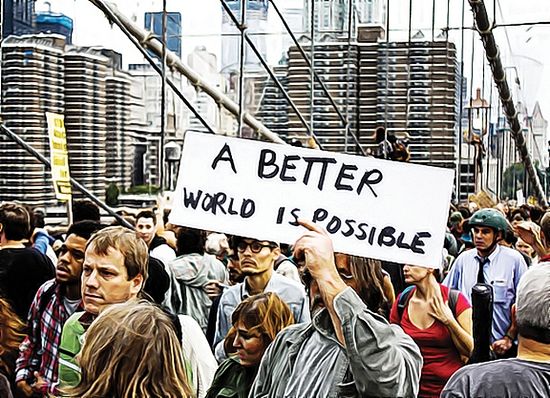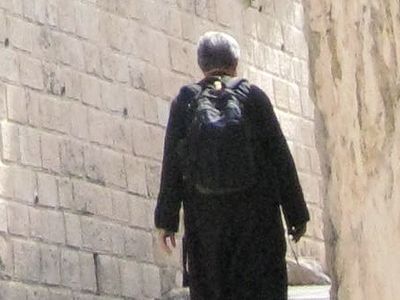You are not saving the world. In fact, you barely make a difference.
These are harsh words. They are meant like a splash of cold water to wake us up from the dream in which we live. They are by no means meant to say that you don’t matter. In fact, you have infinite value. But your value is not based on saving the world or making a difference.
I’ll start at the beginning.
At a certain point in history, people began to be told that they could take charge of history; they could change the world and make it a better place. This was a new idea, even a radicalidea. That point in history is what we now call “modernity.” The beginnings of modernity were not very pretty. Apparently taking charge of history and making the world a better place is messy business. It began with several revolutions. A lot of people had their heads cut off. When the beginning was over, new people were in charge but nothing was particularly different. The French Revolution got rid of the reigning Bourbon family. After many years of social unrest and bloodshed, France had an emperor, Napoleon. Oh, and a new flag.
Strangely, the idea called “modernity” was never blamed for the bloodshed. Instead, the “modern world” took hold and became popular. Today we believe in it, lock, stock and barrel. However, almost everything that makes up the modern project is a lie, little more than an advertising campaign. The lie has become an entire culture.
The truth is, we are not in charge of history or managing the outcome of the world. For one, it’s too big and too difficult. There are so many variables within our lives at any one time that managing them is constantly fraught with the “law of unintended consequences.” In many ways, the second half of the 20th century and the first decades of the 21st should be named the “Unintended Years.” The messy state of the world in which we now live is not natural. It is almost entirely man-made. And it was made by people who believed they could manage the outcome of history.
Saying these things out loud (or in print) will open me to the accusation of “not caring,” and, we are told, the world is in its present mess because “people don’t care.” That is not true. People do care; indeed, they care too much. They care so much that they say ‘yes’ to leaders who tax their money to spend on various wars and other projects meant to manage history. And it fails. Repeatedly.
What doesn’t fail is the ability of the “modern world” to fool itself with the madness of its own arrogance.
How would you live, if you thought that you barely made a difference? Is it possible to live a life without making a difference?
It is not only possible, it is unavoidable. No one alive has any idea whether their life will have “made a difference.” Can you name 15 people who lived in 1915 that made a difference? We know the names of presidents and generals, the occasional assassin, sports heroes and movie stars, but there were 1.8 billion people in the world in 1915. How many of them made a difference?
What does it mean to “make a difference?”
Generally, the idea is linked with the myth of progress. With concerted effort and sufficient resources, we are making a better world, etc. Some undefined future awaits us, if only we care enough to make it happen.
But this is a myth. We can make changes, but change is not at all the same thing as progress. The leaders of the Western world in 1914 started a “war to end all wars.” It was one of the greatest projects of the modern era – the first “modern” war. At its end, there were 38 million casualties. The “winners” of the war sat down in 1919 and redrew the map of the world in the Treaty of Versailles. Every conflict that has occurred since that time has pretty much been driven by the arrogance and mistakes of the maps they drew. The world has been stuck repeating the same war all over the globe as we suffer the consequences of the “better world” we created.
They redrew the map of Europe, laying the foundation for years of turmoil in the Balkans. They redrew the Middle East, inventing new countries with little regard to the history and composition of the new nations. The war they started gave birth to the Communist revolutions that enslaved Russia and elsewhere for the better part of a century. The treaty gave rise to Hitler. On and on the consequences go, as the world constantly struggles to cope with one new eruption after another. The United States, considered the most successful of all modern projects, has been at war 222 out of its 239 years: that’s 93 percent of its history.
Most of the people who have lived and died over these modern centuries, only wanted to live and love and die a decent death. Farmers wanted to farm; mechanics wanted to fix their machines; parents wanted to raise their children in peace and safety; teachers wanted to share what they knew with another generation; and so on. But all of these things have largely been disrupted by the drive for a better world. Farmers are disappearing; the machines have taken over many lives; families are in almost total disarray; teachers long to quit a profession that has become one long series of frustrations. The better world is always in the future.
The better world has no place within the Christian life.
We have no commandment from God to make the world a better place. We have no commandment from God to “make a difference.” Only God makes a difference, and only God knows what “better” would actually mean. As Christians, the proper life is one lived in accordance with the commandments. We should love. We should forgive. We should be generous and kind. We should give thanks to God always and for everything.
We should understand that this is a description of the “better world.” We are not making a better world, we’re waiting for the coming of the Kingdom of God. With every act of love, there is the Kingdom. With every act of forgiveness, there is the Kingdom. Every act of generosity and kindness sees its inauguration. As Christ told us, “The Kingdom of God is among you.”
Modernity is the practice and faith of gross idolatry. We worship technology, money, politics, science, everything that we believe is a human tool capable of building a better world. No tool is any better or different than the people who use them. A bad man cannot use a good tool to make a good world. A bad man makes a bad world and nothing more.
When we were baptized, we were asked to renounce the devil. More than that, we were asked to spit on him. That same devil suggested to Christ that he could make the world a better place if only He would bow down and worship the devil. Christ rebuked him. The same offer has been made to us. It is called “modernity,” and it is a devil’s bargain.
It is for us to renounce him, and spit on him along with his bargain. Christ will give us back our souls.
There are right and wrong questions. When we stand before the judgment seat of Christ, we will not be asked whether we made a difference or whether we left the world a better place. The questions will be about the commandments. Feeding, clothing, visiting, etc., are very homely practices (Matt. 25). It doesn’t take all of the resources of the modern world to do them. They are all immediately at hand.
The better world and making a difference is a conversation we should refuse to engage: it does not belong to us. Speak the truth. Keep the commandments. Let God make all the difference in the world.




